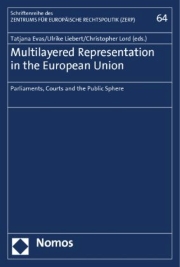 The evolving European Union brings up vital questions about where democracy is heading. This book contributes to this discussion by offering critical appraisals and constructive propositions by eminent experts engaging with the novel configuration of ‘multilayered representation’. Key issues are the ‘European Multilevel Parliamentary Field’, the role of European Jurisprudence for representation, and the emerging European public sphere.
The evolving European Union brings up vital questions about where democracy is heading. This book contributes to this discussion by offering critical appraisals and constructive propositions by eminent experts engaging with the novel configuration of ‘multilayered representation’. Key issues are the ‘European Multilevel Parliamentary Field’, the role of European Jurisprudence for representation, and the emerging European public sphere.
A number of RECON researchers contribute to the book. The first section ‘Representation in the European multilevel parliamentary field’ re-assesses the state of representation in the EU with a focus on the issues of political equality and public control in relation to the European and national parliaments. Three chapters in this part rely on research conducted within RECON’s WP 3. Christopher Lord and Johannes Pollak argue that the German Constitutional Court in its 2009 Ruling on the National Act Approving the Treaty of Lisbon raises important questions about political equality in the apportionment of EP seats. Sandra Kröger with Richard Bellamy enquires whether domestic representative institutions – parliaments and parties – can and should still provide a forum for either reasonable disagreement or control of power over issues of European governance. Ben Crum and John Erik Fossum contribute to the research field with the conception of the ‘multilevel parliamentary field’. They suggest that in the context of the internationalisation of politics this notion refers to a system of parliamentary democracy beyond the nation state, therefore also offering a framework for better understanding the mechanisms and preconditions for effective democratic control of political power in the EU.
The second section of the book ‘Reconstituting representation through European jurisprudence’ relocates the focus of debate from the classic parliamentary representative institutions to (national and European) courts. Speaking to RECON’s WP 2, it asks to what extent these (do, should or could) play a role in protecting citizens’ channels of representation or providing them with new avenues for representing their claims. Tatjana Evas and Ulrike Liebert compare the role of domestic constitutional courts in the EU system of multilevel judicial governance. Carlos Closa and Pablo José Castillo Ortiz present systematic comparative data on the engagement of national constitutional courts with European integration, specifically through their adjudication on the constitutionality of the European treaties.
The third section addresses forms and preconditions for contestatory representation by political parties, civil society and the public sphere in EU politics and policy-making, which has been studied within RECON’s WP 5. Adopting a decentred view on representation in the EU, civil society and the public sphere are conceived here as fields of contention by a plurality of contending agents, and, at the same time, public forums for representing contestatory opinions, claims, and discourses. The three chapters in this section tackle the question about the potential and shortcomings of these substantive forms of representation in the EU polity from three different angles. Aleksandra Maatsch explores the party politics of EU Treaty ratification in the national parliaments of old and new EU member states. Pieter de Wilde, Asimina Michailidou and Hans-Jörg Trenz continue this debate by switching from national parliamentary debates between parties to online news media debates by citizens. Ulrike Liebert finally re-examines the widespread belief that the EU cannot build a representative democratic constitution as it lacks a necessary requisite – a European demos. She tests the ‘no demos thesis’ in different fields of discursive representation of the contentious debates about EU constitutional treaty reforms.
The book also contains chapters by Philippe C. Schmitter, Richard Rose, Dagmar Schiek and Harald Koch.
The volume includes substantially revised chapters that were presented and discussed in July 2010 at a joint WP 2, WP 3 and WP 5 RECON workshop hosted by the Jean Monnet Centre of the University of Bremen.
Full info:
Multilayered Representation in the European Union: Parliaments, Courts and the Public Sphere
Tatjana Evas, Ulrike Liebert and Christopher Lord (eds), Nomos, 2012